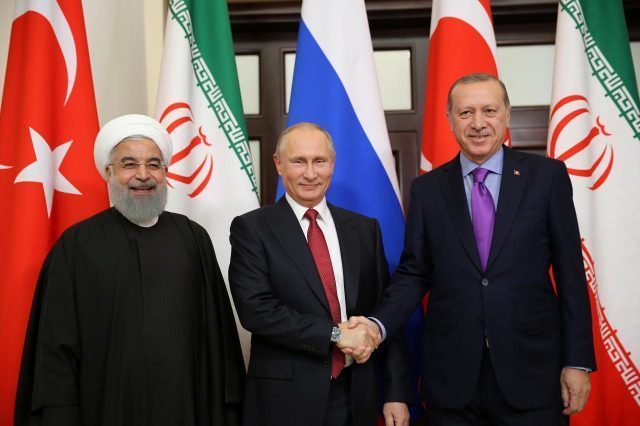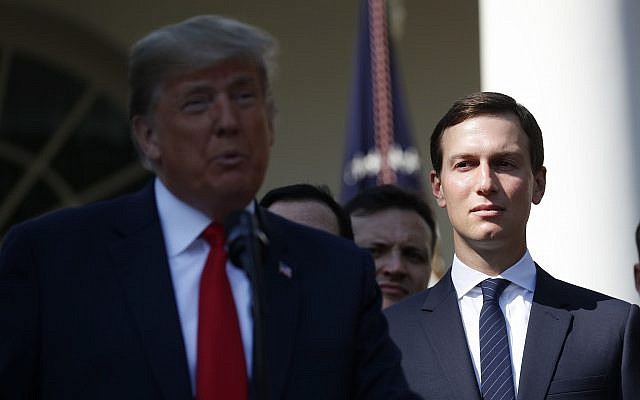Andrew Korybko and Hamsa Haddad |
President Rouhani’s visit to Sochi to meet with his Russian and Turkish counterparts is being hailed as a success in the Alt-Media Community, and it did indeed pave the way for the long-awaited and so-called “political solution” to the War on Syria as stipulated by UNSC Res. 2254, but certain challenges have been ‘conveniently’ glossed over in the usual coverage about this topic.
Instead of analyzing this major event from the conventional perspective of highlighting its positive advances like many other people are doing, it’s useful to approach it from a different angle in order to grasp a sense of some of the obstacles that still remain, all with the intent of better understanding what really needs to be done before a lasting peace can be truly implemented in the war-torn country.
The first issue is that one needs to accept that while it was formally a trilateral summit between the Russian, Iranian, and Turkish leaders, President Putin had earlier briefed his counterparts in the US, “Israel”, Saudi Arabia, and Egypt about the upcoming meeting, suggesting that Moscow is very serious about getting the support of all stakeholders behind its initiative.
While it generally evades public commentary, Russia’s envisioned 21st-century role is to become the supreme “balancing” force in the Eurasian supercontinent, to which end it has recently sought to strengthen its relations with all actors on the landmass, including those with which it hasn’t traditionally been very close to such as Saudi Arabia.
In order for President Putin’s peace proposal to work, he needs to ensure that none of Syria’s enemies will sabotage it, hence the importance of briefing them on his Astana cooperation with Iran and Turkey in order to allay whatever fears – be they real or imagined – that they may have.
This is particularly important as it relates to “Israel”, because Tel Aviv has said on numerous occasions that it will not tolerate the presence of the Iranian Revolutionary Guard Corps (IRGC) and their Hezbollah allies near the occupied Golan Heights, and have actually bombed these two pro-government forces on numerous occasions in the past.
Read more:There’s more to the Saudi-“Israeli” alliance than meets the eye
it’s now relevant to discuss some of the thornier topics that were presumably discussed during the gathering of what has essentially amounted to the Mideast Concert of Great Powers.
It’s Russia’s responsibility to ensure that “Israel” doesn’t get too out of control to the point where it disrupts the incipient peace process that Moscow is now leading, which explains the importance of President Putin’s contacts with both Netanyahu and the two Salmans (both the King himself and his more powerful Crown Prince son).
Read more:Saudi-“Israeli” Leaks: Collusion Or Opportunism?
Having explained the complicated diplomacy going on behind the scenes and beyond the Sochi Summit, it’s now relevant to discuss some of the thornier topics that were presumably discussed during the gathering of what has essentially amounted to the Mideast Concert of Great Powers.
It’s impossible to know the specifics of what was said or not, but judging by President Putin’s pronouncement that both the government and “rebel” forces will have to “compromise”, it can be inferred that the subject of President Assad’s post-conflict political future was brought up, as well as the ultra-contentious issue of Kurdish “decentralization”.
Russia has stated on numerous occasions that it is not in support of President Assad personally, but is in the Arab Republic in order to fight terrorism and uphold the constitutional order of the country. This is a critical clarification because it complements what Moscow has previously said about how his fate can only be determined by the Syrian electorate, not any outside force.
By the same token, Russia has also insisted that UNSC Res. 2254’s mandate for constitutional revisionism can only be undertaken by the Syrians themselves, despite authoring a “draft constitution” in late January after the first Astana meeting in order to jumpstart what had hitherto been a stalemated process. As part of its “suggestions”, Moscow controversially proposed the “compromise” of Kurdish “decentralization” in order to find a delicate middle ground between this group’s self-declared and anti-constitutional “federalization” (internal partition) and Damascus’ desire to retain the country’s constitutional unity.
Understanding that Russia has said that both sides of the Syrian conflict must enter into “compromises”, it’s conceivable that one of the scenarios being discussed might be for the “rebel” forces to accept that President Assad can remain in office for the foreseeable future – whether during a transitional/interim stage or even as a participant in the next round of UNSC Res. 2254’s stipulated elections – in exchange for Damascus agreeing to grant the Kurds “decentralization”.
Read more:Riyadh-Tehran rivalry in Yemen: Where is it heading?
The reason why this is a possibility is because there doesn’t seem to be any realistic chance that the Syrian Arab Army (SAA) will be able to liberate the YPG-/SDF-occupied corner of northeastern Syria without the support of the Russian Aerospace forces, which don’t seem interested at all in sparking what could inevitably become a fast-moving global crisis if they make a military move to dislodge the 10 American bases in this region.
Turkish President Erdogan has hinted that he would like to stage an anti-PKK successor operation to last year’s “Operation Euphrates Shield” in order to smash the Kurdish groups that his government considers to be terrorists, but he also knows that his nominal NATO membership somewhat prevents him from doing this so long as hundreds of American troops are present in the battlespace, which is why he’s trying to get Russian support – whether direct or otherwise – for this plan.
Nevertheless, he probably won’t be successful due to the agreement that Presidents Putin and Trump reached with one another on the sidelines of the APEC Summit in Vietnam earlier this month, where they publicly released a joint statement but probably discussed many more details in private, whether amongst themselves personally or between representatives of their permanent military, intelligence, and diplomatic bureaucracies (or “deep states”).
The most controversial known outcome of that declaration was that both sides said that all foreign forces would have to eventually leave Syria, which was ambiguous enough to make some commentators worry at the time that Russia had “sold out” the IRGC and Hezbollah.
Such fears were unfounded, however, since Moscow later clarified that both actors were legally in the country at the invitation of the host government and that it’s actually the US’ forces that are illegal and need to leave, though President Trump curiously didn’t seem to interpret it that way when he agreed to the declaration.
In any case, it’s possible that this specific clause was deliberately left ambiguous by both sides as a form of psychological warfare against the other’s decision makers, knowing that each would interpret it differently but nevertheless figuring that it’s better for there to be some positive outcome from the two leader’s meeting than none whatsoever.
That said, and recalling Russia’s envisioned “balancing” strategy in the Mideast, it’s indeed very possible that Moscow might gently press Damascus sometime in the future to ensure that the IRGC and Hezbollah don’t deploy so close to the occupied Golan Heights that it would “provoke” “Israel” to strike them and endanger the entire peace process.
In addition, recalling what was analyzed about the shrewd foresight that Russia is being guided by, there seem to be no realistic chances that Moscow will resort to brinksmanship with Washington over the Syrian Kurds and their illegally hosted US bases in the northeastern part of the country, which is probably why President Putin is attempting to broker a series of “multilaterally acceptable” “compromises” on this issue.
One can only speculate about the details, but any Russian-mediated “political solution” to the Kurdish conundrum in northeastern Syria will likely involve a combination of political, economic, and military factors. About the first category, a vaguely defined “decentralization” is Russia’s ultimate goal in order to not inadvertently lose the groundswell of soft power that it’s gained over the past two years by contradicting Damascus and decisively backing what President Assad and his emissaries had consistently viewed as the anti-constitutional “federalization” (internal partition) of the country.
As the saying goes, “the devil is in the details”, and it’s here where the second and third components come into play. Syria agreed in spring 2016 to allow Russia to rebuild its oil and gas industries after the war, but most of its energy resources are in Kurdish-occupied territory.
Syria desperately needs some of this revenue in order to rebuild the entire country at large, but with Russia also having a stake in these assets and the overall goal of strengthening the country’s post-war economy, it’s conceivable that Moscow could try to mediate a revenue-sharing arrangement between Damascus and the Kurds, with Russia receiving a portion of the profits as well.
This employment of “energy diplomacy” could at the very least help to ease tensions for the time being and prevent any outbreak of hostilities between the two camps across their de-facto line of control along the Euphrates River, a state of affairs which will probably be implicitly enforced by Russia and the US per a “gentleman’s agreement” to keep their respective allies at bay while negotiations are ongoing. The proverbial elephant in the room is the post-war status of the American troops in northeastern Syria and their 10 bases in the region, which Damascus is reluctant to ever accept as “legitimate” because it could be perceived as being a huge humiliation for the government.
This isn’t by any means a “perfect” solution, but it appears to be the most viable one given the structural constraint of Russia not wanting to irresponsibly enter into nuclear brinksmanship with the US over its 10 bases and hundreds of troops in northeastern Syria.
Thus, since there are scant chances that Russia will militarily work to dislodge the Pentagon’s presence nor is it likely to back the SAA’s efforts to do so either, the only “workaround” is for Moscow to try and frame Washington’s deployments as de-facto constituting some sort of “peacekeeping” responsibilities through the “de-escalation zone” framework for an undeclared mission in the Kurdish-occupied portions of Syria where they’re already based.
Read more:The crackdown in Saudi Arabia: anti-corruption drive or ruthless power politics?
This isn’t by any means a “perfect” solution, but it appears to be the most viable one given the structural constraint of Russia not wanting to irresponsibly enter into nuclear brinksmanship with the US over its 10 bases and hundreds of troops in northeastern Syria. In other words, since none of this would be openly agreed to, mostly because Damascus probably wouldn’t accept it and so that Moscow can “save face” in a sense, it can be said that the Arab-Kurdish issue in Syria might remain a “frozen conflict” kept under control by the speculated “gentleman’s agreement” between Presidents Putin and Trump, though with Russia actively brokering some degree of a “political solution” via “decentralization” in order to temporarily calm on-the-ground tensions and generate a revenue-sharing agreement for all sides.
Turkey might not like this because of its well-grounded fear that the Syrian Kurdish PYD-YPG are really just offshoots of what they consider to be the terrorist PKK, but under the present circumstances, there’s little that President Erdogan can do aside from unilaterally invading northeastern Syria and dealing self-inflicted damage to the Russian-Turkish Strategic Partnership, to say nothing of risking a more dramatic falling out with his nominal US and NATO “allies”.
Seeing as how Russia and Turkey have officially completed their rapprochement and are now actively cooperating on a wide variety of ventures, one of the most significant of which is the Turkish/Balkan Stream through Southeastern Europe and beyond, the odds are against President Erdogan jeopardizing his close personal relations with his Russian counterpart, especially bearing in mind how the two sides have just clinched an unprecedented deal for Moscow to sell Ankara its state-of-the-art S-400 anti-air missiles.
As for how Iran figures into all of this, it’s wisely staying on the sidelines and remaining silent for the time being, prudently watching how events develop and doing nothing that could even be remotely perceived as interfering with this complicated political process, though consistently abiding by its principles in reiterating its support for Damascus and the international legal mechanisms guiding the “political solution” in the country.
In any case, Iran would still be compelled to act in whatever manner it sees fit if its military interests vis-à-vis the IRGC and Hezbollah are endangered in any way that goes against Damascus’ sovereign preferences, such as if external pressure was put on Syria to seek their removal, up to and including more “Israeli” airstrikes against their positions.
All three members of the Mideast Concert of Great Powers – Russia, Iran, and Turkey – are dedicated to seeing peace finally prevail in Syria, and while none of them wants to “compromise” on their core interests in the country
Read more:What’s Kushner’s connection To The Saudi “Deep State” Coup?
As a few concluding observations, the Sochi Summit was very successful in that it laid the basis for seriously pursuing UNSC Res. 2254’s mandated “political solution” to the War on Syria via constitutional “reform” and new elections, but it also proved that the conflict is now shifting from the battlefield to the boardroom as political intrigue takes precedence over military tactics following the defeat of Daesh.
Furthermore, Iran would ideally like to deploy its forces anywhere in Syria with the consent of Damascus, but the national authorities might recommend (per Russia’s “suggestion”) that they stay away from the occupied Golan Heights so as to not “provoke” “Israel” and unwittingly trigger a larger and more conventional conflict between the three parties.
All three members of the Mideast Concert of Great Powers – Russia, Iran, and Turkey – are dedicated to seeing peace finally prevail in Syria, and while none of them wants to “compromise” on their core interests in the country, it seems inevitable that they might collectively have to do so alongside Damascus and the “rebels” in order to bring an end to this war.
Read more:The US-Iranian Proxy War Will Continue In “Syraq”
For example, none of the three states wants the US to remain in northeastern Syria, but the options for removing the Pentagon’s presence are presently unrealistic given the possibly apocalyptic conditions that this might entail. Similarly, Turkey doesn’t want to see the Kurds receive “decentralization”, but its hands are proverbially tied in dealing with this. Furthermore, Iran would ideally like to deploy its forces anywhere in Syria with the consent of Damascus, but the national authorities might recommend (per Russia’s “suggestion”) that they stay away from the occupied Golan Heights so as to not “provoke” “Israel” and unwittingly trigger a larger and more conventional conflict between the three parties.
Finally, Russia could actually gain by “balancing” all sides in accordance with its envisioned 21st-century geostrategy, but this is extremely difficult to do “perfectly” and it might accidentally end up undermining some of the regional trust that it’s worked so hard to build up over the past couple of years despite its positive intentions in preserving stability and facilitating the emerging Multipolar World Order.
DISCLAIMER: The author writes for this publication in a private capacity which is unrepresentative of anyone or any organization except for his own personal views. Nothing written by the author should ever be conflated with the editorial views or official positions of any other media outlet or institution.
Andrew Korybko is a political analyst, journalist and a regular contributor to several online journals, as well as a member of the expert council for the Institute of Strategic Studies and Predictions at the People’s Friendship University of Russia. He specializes in Russian affairs and geopolitics, specifically the US strategy in Eurasia. Hamsa Haddad is a Moscow-based PhD candidate.The views expressed in this article are authors’ own. It does not reflect Global Village Space Editorial policy.














